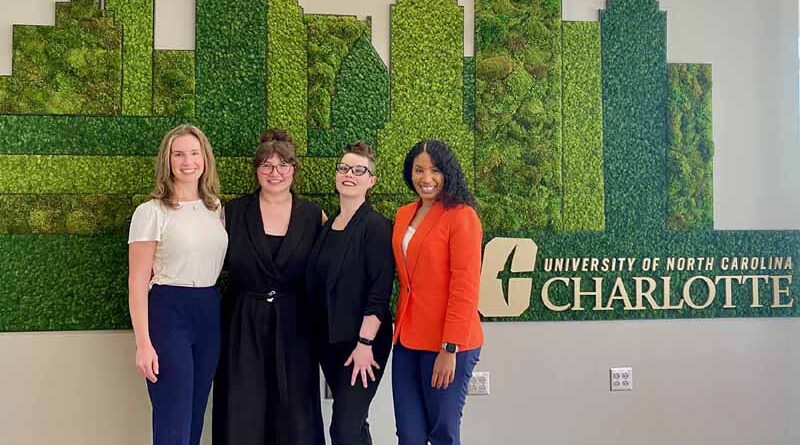Data From Charlotte MBA Operations Management Course Impacts Recycling Habits
Amy Drew never imagined that digging through trash at the break of dawn would be part of her Master of Business Administration studies. Yet, that is exactly what she and classmates did to gain crucial data for an MBA operations management course last fall.
For their research project “Contamination Station,” Drew and project teammates Ashley O’Bruba, Brooke Morrison and Rachel Slade dug into ways to discourage people from tossing cups into recycling bins at Atkins Library. They wanted to help the collection of recyclables on campus run more smoothly, since the pile of misdirected items can hurt employee morale, affect efficient operations and add cost and time.
“While the goal of our project was to demonstrate the learning competencies of the course, we were over the moon that our intervention actually had a positive impact on people’s recycling habits,” Drew said. “It was rewarding to know that our work could help a real-life problem and benefit the recycling team at UNC Charlotte, who were instrumental in giving us access to collect the data and business context. Dr. Fraher’s zest for teaching and genuine commitment to helping every student succeed also played a big role in helping our project get to the next level.”
The students joined Charlotte’s recycling team at Atkins Library from 6 to 8:15 a.m., learning that many items were in the wrong bins, with coffee cups ranking as the main culprit. They designed new signage and gathered subsequent data showing their signs with vibrant red coloring and fewer words reduced the errors.
Project yields actionable insights
Since the course ended, Charlotte’s Building Environmental Services has implemented the students’ recommended signage in Atkins Library and other buildings.
“Sometimes students suggest something that we’ve already tried, but if we talk through what we tried and why it didn’t work, then we may realize that it is worth trying again, or that there’s a better alternative to try,” said Shannon Caveny-Cox, solid waste coordinator with the Office of Sustainability. “That actually happened on this project. The students suggested signage, which had been tried before, but since they were able to actually measure results, then we had data and not just feelings to go by.”
The MBA operations management class in the Belk College of Business looks at areas including process analysis and reengineering, workforce management, material and inventory management, aggregate planning and total quality management.
“As part of the class requirements, student teams complete culminating projects that use the tools they have learned in the course,” said Visiting Clinical Assistant Professor Andy Fraher. “This team took the assignment well beyond the basics and completed an outstanding project. Sustainability is a key focus for UNC Charlotte, and the students’ project not only demonstrated what they had learned, but also applied their knowledge in an impactful, useful way.”
Project expands class content
The in-depth work transformed what could have been static content, said O’Bruba. “With anything academic, sometimes it is two-dimensional and inert. Researching and applying a topic to a real-world project makes the content feel livelier and makes the work we do as students feel purposeful and impactful.”
For O’Bruba ’19, ’22, who is assistant director with Charlotte’s Niner Finances, a goal for her studies is to use what she learns to benefit others in an informed way.
“Although many think getting an MBA is all about working in the financial sector and creating profit for large corporations,” she said, “there are ways to apply an empathetic lens to solve these multidimensional issues or at least reduce barriers to the solution. I firmly believe this happens outside of bound text and online articles. The theory is just theory until applied to the real world, and projects like this have been worthwhile.”
Classmate Slade agreed. “Conducting this research project about a real-world problem allowed me to better understand the course concepts,” she said. “It was really rewarding seeing everything come together in real time. From this project I have gained a greater appreciation for recycling and an enhanced curiosity for field research.”
Caveny-Cox with the Office of Sustainability noted that the students and staff both gained from the project.
“I think that getting students involved in solving real-world problems is a great experience for them,” she said. “They get to apply what they are learning in classes, which is one of the best ways to make sure that they understand the material. I think it is also good for staff, since it forces us to slow down and look at things from a different perspective.”

